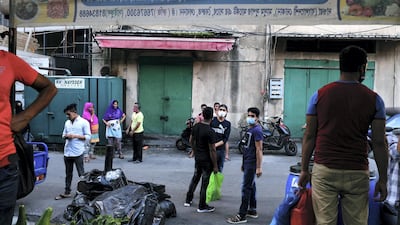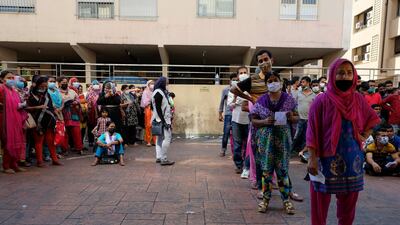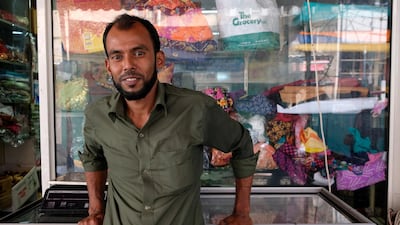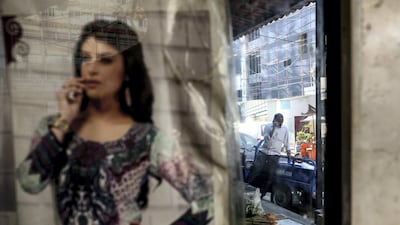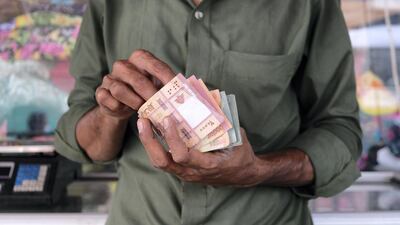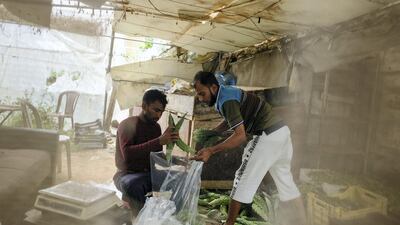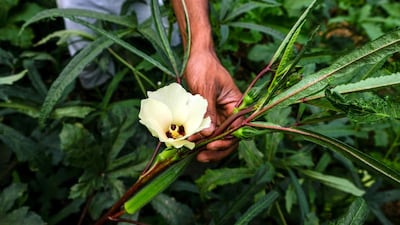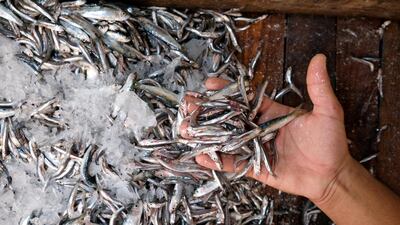It is a warm Sunday afternoon in Dawra, a neighbourhood near the highway leading north from Beirut. The area is busy all week, but even more so on Sundays. This is when Lebanon’s migrant workers have a day off, and shops catering to Sri Lankan, Indian and Ethiopian customers are full.
Among the busiest is a small shop with a Bangladeshi eatery on the first floor and a tailor and a phone repairer downstairs.
“But these days are slower than usual. Everyone is leaving now,” said Kamal Mia, who sells vegetables outside the shop.
The boxes in front of him are filled with vegetables used in many South Asian cuisines: spiky bitter gourds, big zucchini-like laos and bouquets of different greens. All are grown by Bangladeshi farmers, side by side with local favourites like tomatoes and cucumbers.
Mr Mia, a father of two from Barisal in coastal Bangladesh, has been in Lebanon for three years. Like the rest of the Bangladeshi community in Lebanon, he came here to work, first at a car dealership and later on as a greengrocer.
“I used to send back $400-500 per month. But this year I haven’t been able to send anything.”
While 2020 has been a year of distress globally, things have been particularly bad in Lebanon. An economic crisis has caused the currency drop more than 70 per cent and prices to multiply. More than half of the population now lives in poverty, says the UN.
Among the hardest hit are migrant workers, who number in the hundreds of thousands. The Bangladeshi community alone is around 150,000 people, perhaps the largest in Lebanon.
Faced with a crisis that looks to be here to stay, many are trying to return home.
“We have a list with 7,745 names. We will help them first and then continue with others,” said Abdullah Al Mamun, first secretary at the Bangladesh Embassy.
Mr Al Mamun is seated behind a desk in the yard outside the embassy along with three colleagues. About 400 people have gathered for a flight leaving the next day from Beirut to Dhaka.
The sun is strong and people move to stand in the shade. A Lebanese colleague calls out people’s names, mixing Bengali words in with her Arabic.
Flights home cost $400, and the embassy mainly assists in sending back undocumented workers. But registration stopped in March because of the Covid-19 pandemic, so the list will surely grow once it starts again.
“Everyone wants to travel now, so they will give their names as soon as they can,” said Babu Shaha, a Bangladeshi journalist living in Lebanon since 1994.
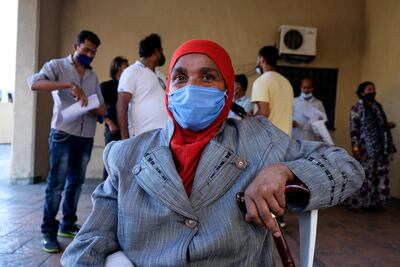
On a chair in the shade sits a woman with a wooden cane and one of her legs wrapped in bandage. She is among 100 Bangladeshis who were injured in the explosion at Beirut port on August 4.
“I fell on broken glass and hurt my leg and side body. I stayed in hospital for 16 days; other Bangladeshis collected money to help pay the bills,” Hasna Begum, who is returning home to Dhaka, said.
“It still hurts but I can walk slowly.”
Six Bangladeshis lost their lives in the explosion, more than any other nationality after Lebanese and Syrians. The blast also hit the BNS Bijoy, a ship with Bangladeshi peacekeepers contributing to the UNIFIL mission in Lebanon.
“We were docked 250 metres from the site during the explosion. A total of 36 from the crew were injured, both major and minor injuries, but all are recovering now and away from danger,” said Capt M Joinal Abedin, speaking from his ship on the way back to Dhaka.
Bangladesh, the largest peacekeeping contributor in the world, has had troops in Lebanon since 2010. The country was among those sending aid after the explosion, including food and medicine.
Citizens from many countries were hurt in the explosion, and the list of deceased includes Filipino, Egyptian, Ethiopian and Pakistani names.
“Many migrant workers live and work in the affected areas. A lot of them lost their jobs and sometimes ended up in the streets,” said Farah Baba, from the Anti-Racism Movement.
Workers from a number of countries have returned home, often through volunteer efforts. A fundraiser covered flights home for 120 Sudanese and an Ethiopian activist group helped repatriate over 100 people.
Just around the corner from the eatery in Dawra sits a woman and her husband, both from Dhaka. They consider travelling back but have yet to collect the money.
“It’s more than $700 for two tickets. And there’s no work here now. The hotel where we used to work closed due to the crisis.”
The next shop on the street is owned by Ismail Mohammad, one of the first Bangladeshi merchants to establish himself in Beirut in 2009.
“I realised there was no one catering to over 50,000 Bangladeshis here,” he said.
Mr Mohammad, whose customers call him “bhai”, Bengali for brother, started importing rice, fish and spices. He did well for about 10 years, until the crisis hit.
“I used to sell 5,000 boxes per month, now I sell 500. We use the government’s fixed rate of 3,900 lira, which means selling everything at a loss. We can’t charge more, our customers don’t have money.”
The black market rate for the US dollar, officially still pegged at 1,500 lira, is now close to 9,000.
“A friend told me when I first decided to move here: ‘Don’t do it, the government gives no support to businesses’. Now I remember what he said,” Mr Mohammad said.
Earlier this year, 400 workers, including 250 Bangladeshis, went on strike at the waste management company Ramco. The strike, the first of its kind by migrant workers in Lebanon, was met by police brutality and did not solve their main demand: to be paid in dollars, as stated in their contracts.
Mr Shaha says that few Bangladeshis want to work for Lebanese wages any more.
“Ramco started to recruit more Syrians instead. Even if they pay 900,000, which used to be $600, it’s nothing now.”
Although most Bangladeshis are employed in domestic work or as cleaners, the are others too, Mr Shaha said. "There’s a professor at AUB and a UN official living in my building.”
Mr Shaha says he would like to stay in Lebanon if possible.
“I have been happy here for 25 years. The culture, climate and the people are all good. I wish to stay but it will be hard."

